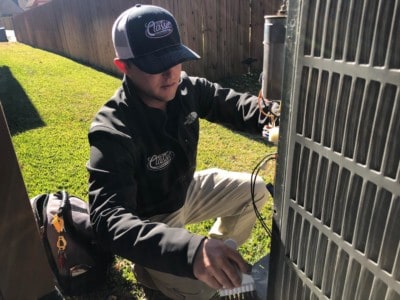Navigating the Decision to Repair or Replace Your Air Conditioner
Deciding whether to repair or replace the air conditioner is a pivotal moment for any homeowner, especially in McKinney’s relentlessly hot climate. Here, where temperatures soar, an efficient air conditioning system is not merely a luxury; it’s a vital component of home comfort. This decision isn’t just about immediate relief from the heat; it’s about considering the cost-effectiveness and long-term benefits that impact your home’s environment and budget.
When your AC unit begins faltering, the question of “repair or replace the air conditioner” inevitably surfaces. It’s a complex choice influenced by factors such as the age of the unit, the frequency of breakdowns, the costs of repair, and the potential savings from a newer, more efficient system. Often, the decision comes down to a detailed comparison of “repair vs replace HVAC” scenarios. Each option needs careful evaluation to determine which is more financially prudent and which will ensure enduring comfort.
Due to the extreme weather conditions in McKinney, the stakes are even higher for residents. A well-functioning air conditioner is essential for keeping your home pleasantly cool, ensuring air quality, and managing humidity levels. The relentless heat can make any inefficiency or breakdown a severe inconvenience, prompting an urgent need to assess whether patching up your current system or investing in a new one is the better choice.
When deciding whether to repair or replace HVAC system, it’s crucial to weigh the immediate costs against the long-term savings. Repairing may be less expensive upfront, but replacing an outdated, inefficient unit with a modern, energy-efficient model could reduce your energy bills and increase your home’s value. Homeowners must consider both their current financial situation and their future needs, ensuring they make an informed choice that aligns with their comfort and economic goals in McKinney’s challenging climate.
Understanding the Age and Efficiency of Your Current System
HVAC System Longevity and Performance
Understanding the age and efficiency of your current HVAC system is essential when faced with decisions about its upkeep. As HVAC systems age, their efficiency can decline, leading to increased energy costs and decreased comfort in your home. This choice to repair or replace air conditioner systems is a significant consideration for any homeowner, especially in the challenging climate of McKinney.
Key Factors to Consider:
- System Age: The typical lifespan of an HVAC system ranges from 15 to 20 years. If your system is nearing or beyond this age range, its efficiency could be significantly reduced.
- SEER Ratings: Efficiency in air conditioning units is measured by the Seasonal Energy Efficiency Ratio (SEER). Modern systems must have a SEER rating of at least 13, with the most efficient systems today reaching SEER ratings of 20 or more. A higher SEER rating means better energy efficiency and lower operational costs.
Advancements in HVAC Technology
Technological advancements have dramatically improved the performance and efficiency of newer HVAC models. New systems often have features that enhance comfort and reduce energy consumption, such as variable-speed motors and smart thermostat compatibility. Assessing your current system’s performance against these newer models can provide a clear perspective on the benefits of upgrading.
When to Consider Upgrading
The question of “when to replace HVAC” is crucial if your current unit struggles to maintain a comfortable temperature or if repair costs have become frequent and costly. Upgrading to a new, efficient system can improve your home’s comfort and offer significant energy savings over time.
Is your air conditioner struggling to keep up with McKinney’s heat? Contact Classic Heating & Air to evaluate the efficiency of your current system and explore upgrade options. We can help you make an informed decision on repair vs replace HVAC based on the specific needs of your home and the potential savings from a new installation. Let us assist you in ensuring your home remains a haven of comfort, even in the peak of summer.
Analyzing Repair Costs vs. Replacement Costs
Cost Analysis: Repairing vs. Replacing Your HVAC System
When your air conditioning system begins to falter, a critical decision looms: repair or replace the air conditioner. Understanding the costs of repairing and replacing your existing system with a new one is essential to making a financially sound decision.
Factors Influencing Repair and Replacement Costs
- Frequency of Breakdowns: If your system requires frequent repairs, the costs can quickly add up. A crucial consideration is whether these ongoing repair costs are justifiable when compared to the price of a new, more efficient system.
- Parts Availability: As HVAC systems age, finding replacement parts can become more challenging and expensive. This scarcity can significantly increase the cost of repairs.
- Energy Savings: Newer HVAC systems are typically more energy-efficient and can significantly reduce your monthly energy bills. This saving should be factored into the overall cost comparison, as it can offset the upfront cost of a new system over time.
Our experts can assess your current system’s condition, estimate future repair costs, and compare these with the benefits and costs of a new, efficient system. This analysis can guide you to a decision that saves money and enhances comfort and efficiency in your home.
Make the smart choice for your home and comfort. Replace HVAC systems that are beyond economical repair and embrace the reliability and efficiency of modern air conditioning technology. Contact us today to explore your options and find the best solution tailored to your needs.
Impact on Energy Bills
Energy Efficiency and Cost Savings with New HVAC Systems
When your air conditioning unit is aging or malfunctioning, it can have a substantial impact on your energy bills. Older or inefficient systems work harder to produce the same cooling effect, significantly increasing your monthly expenses. This ongoing cost is a critical factor to consider when deciding whether to repair or replace air conditioner units.
Efficiency and Savings
Modern high-efficiency air conditioners are designed with advanced technology that not only enhances cooling performance but also lowers energy consumption. Upgrading to a system with a higher SEER (Seasonal Energy Efficiency Ratio) rating can lead to substantial energy savings. For instance, replacing an old 10 SEER unit with a new 20 SEER unit can cut cooling costs by up to 50%. This reduction in energy use is not just good for your wallet but also beneficial for the environment.
Repair vs Replace HVAC:It’s essential to weigh the cost of HVAC system repair against the potential energy savings from a new unit. Often, the long-term savings justify the initial expenditure on a new, more efficient model, especially if the existing system frequently needs repairs.
Let us help you choose an HVAC system that maximizes comfort while minimizing costs. Our expert team is ready to provide you with solutions that best fit your needs and budget, ensuring that you enjoy a cooler home more affordably.
Considering the Warranty and Service Life Expectancy
Warranty and Service Life
When it’s time to decide when to replace the HVAC unit or continue with repairs, understanding the warranty and the expected service life of your system is crucial. Warranties provide a safeguard against unforeseen repair costs and offer a clear indication of the manufacturer’s confidence in the durability of their products.
Importance of Warranties
A new air conditioning unit typically comes with a manufacturer’s warranty that can cover major components for up to 10 years. This warranty is vital as it not only protects you from the cost of mechanical failures but also ensures that repairs are conducted with quality parts and skilled service. Homeowners should consider warranty coverage as an essential factor in their repair or replace air conditioner decision-making process, as an active warranty can significantly decrease long-term ownership costs.
Extended Service Life
The service life of an HVAC system is another significant consideration. Most modern air conditioners have a lifespan of 15 to 20 years when properly maintained. Investing in a new system can often be more economical in the long run, as newer models are more energy-efficient and may come with more extended warranties. This means not only better performance but also extended periods without the worry of costly repairs or inefficient operation.
If you’re still wondering about repair vs replace HVAC, remember that upgrading your old system can eliminate the anxiety associated with unexpected breakdowns and inefficient performance. Contact us to learn more about how a new, warranted HVAC system can enhance the comfort and value of your home while providing peace of mind for years to come.
Environmental Considerations
Environmental Benefits of Modern HVAC Systems
When it comes to your home’s air conditioning, the decision to repair or replace the air conditioner can have significant environmental implications. Older AC units not only consume more energy but may also use less eco-friendly refrigerants. Upgrading to a new, eco-friendly model can substantially reduce your environmental footprint.
Advancements in Eco-Friendly HVAC Technology
Modern HVAC systems are not just about cooling or heating your home. They are designed with the environment in mind, incorporating cutting-edge technology that makes them more efficient and eco-friendly. These advancements include:
- Improved Energy Efficiency: Newer models are significantly more energy-efficient, thanks to innovations such as variable speed fans and modern heat pump technologies. These improvements help reduce the amount of energy used for heating and cooling, which in turn decreases carbon emissions.
- Eco-Friendly Refrigerants: Today’s air conditioners use refrigerants that have a much lower potential for ozone depletion and global warming. This shift is crucial for reducing the overall environmental impact of air conditioning systems.
Making Sustainable Choices
The decision between repair vs replace HVAC often comes down to a balance between cost and environmental impact. Here’s a simple “HVAC repair vs replace chart” approach to consider:
- Repair: This may be suitable if the system is relatively new and uses current, eco-friendly technologies.
- Replace: Often the best choice for older systems that use outdated technologies and inefficient components.
Contact us today for more information on how you can contribute to a healthier planet with your HVAC choices. Together, we can make a significant difference in our community’s sustainability efforts.
Evaluating Home Comfort and Air Quality
Enhancing Home Comfort and Air Quality with AC Upgrades
Deciding whether to repair or replace air conditioners involves more than just addressing breakdowns—it’s about significantly improving the overall comfort and air quality of your home. An updated AC system can revolutionize your living environment, offering advanced features that regulate temperature, control humidity, and filter air more effectively.
Key Benefits of New AC Systems
- Improved Humidity Control: Modern air conditioners are better equipped to manage humidity levels within your home. Excessive humidity can encourage mold growth and increase discomfort; newer systems maintain comfortable moisture levels, making your living space more pleasant and healthier.
- Enhanced Air Filtration: New technology in air conditioners includes superior filtration systems that capture and remove airborne pollutants before they can circulate through your home. This is crucial for family members with allergies or respiratory issues, as it significantly reduces the irritants in the air.
- Consistent Temperatures: Older systems often struggle to maintain a consistent temperature throughout the home, leading to hot or cold spots in different rooms. New HVAC systems provide a more uniform distribution of air, ensuring that every corner of your home remains comfortable.
Upgrading your air conditioner is not just an investment in your home’s infrastructure; it’s an investment in the health and comfort of everyone who lives there. Contact us to find out how a new, efficient system can transform your living space.
Conclusion: Making the Smart Choice for Your Home in McKinney
Making the Smart Choice for Your Home in McKinney
As you decide whether to repair or replace your air conditioner, consider the long-term benefits and cost implications for your home in McKinney. Throughout our discussions, we’ve highlighted the importance of evaluating the efficiency, age, environmental impact, and overall condition of your current HVAC system. These factors are crucial in determining the most cost-effective and beneficial solution for your home comfort needs.
Summarizing Key Considerations:
- Efficiency and Cost Savings: New, high-efficiency systems can significantly reduce your energy bills, offering long-term savings that help offset the initial investment.
- Advanced Features: Upgrading to a newer model can improve air quality and comfort through better humidity control, enhanced air filtration, and more consistent temperature distribution throughout your home.
- Environmental Impact: Choosing an eco-friendly system not only supports global sustainability efforts but also aligns with local initiatives to make McKinney greener.
- Health Benefits: Cleaner air and optimal indoor climates have a direct positive impact on the health and well-being of your family.
Whether you’re looking to upgrade to a more efficient system or need advice on maintaining your current setup, we are here to help. And remember, service within 2 hours, or it’s free! We ensure that every interaction is not just about solving a problem but about adding value and peace of mind to your life. Let us help you make an intelligent choice that benefits your home and family for years to come.
 Schedule a Service
Schedule a Service

 Call Us 214-851-2824
Call Us 214-851-2824

